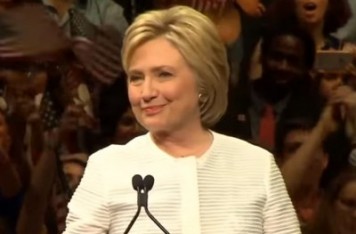 The FBI on Tuesday handed over to Congress investigative materials from its investigation into the Clinton email investigation. The materials are believed to include an overall summary of the evidence agents reviewed during the investigation; summary reports of interviews with Clinton and her tops aides known as 302 forms; and copies of emails containing classified information that were found on Clinton’s private server. The Clinton campaign was predictably critical of the decision. In a prepared statement, they called on the FBI to release all of the materials publicly – knowing full well the materials are almost certainly not going to be released in full any time soon. They are simply projecting a false front of conference in an effort to shape any new revelations as purely partisan attacks.
The FBI on Tuesday handed over to Congress investigative materials from its investigation into the Clinton email investigation. The materials are believed to include an overall summary of the evidence agents reviewed during the investigation; summary reports of interviews with Clinton and her tops aides known as 302 forms; and copies of emails containing classified information that were found on Clinton’s private server. The Clinton campaign was predictably critical of the decision. In a prepared statement, they called on the FBI to release all of the materials publicly – knowing full well the materials are almost certainly not going to be released in full any time soon. They are simply projecting a false front of conference in an effort to shape any new revelations as purely partisan attacks.
Here is what campaign spokesman Brian Fallon told Reuters:
This is an extraordinarily rare step that was sought solely by Republicans for the purposes of further second-guessing the career professionals at the FBI.We believe that if these materials are going to be shared outside the Justice Department, they should be released widely so that the public can see them for themselves, rather than allow Republicans to mischaracterize them through selective, partisan leaks.
In issuing this statement, the Clinton campaign appears to be using almost exactly the same tactic they used back in January when news broke that some of her emails contained information classified at the highest level, TS/SCI.
In response to those reports back in January, Fallon said, “We firmly oppose the complete blocking of the release of these emails. Since first providing her emails to the State Department more than one year ago, Hillary Clinton has urged that they be made available to the public. We feel no differently today.”
He added, “This flies in the face of the fact that these emails were unmarked at the time they were sent, and have been called ‘innocuous’ by certain intelligence officials.”
What the campaign was not counting on at the time is that approximately six months later the Director of the FBI would come out and expose their lies and half truths.
On July 5, Director Comey did just that, stating “[S]even e-mail chains concern matters that were classified at the Top Secret/Special Access Program level when they were sent and received.”
He followed that up with an even more devastating blow, saying the FBI found “evidence to support a conclusion that any reasonable person in Secretary Clinton’s position, or in the position of those government employees with whom she was corresponding about these matters, should have known that an unclassified system was no place for that conversation.”
Already getting burned once, you might think the Clinton campaign would trying something different time around. Yet, as Fallon’s latest statement shows, the campaign is again trying to convey a message that it has nothing to hide.
So, why are they doing this?
Because they are much more likely to get away with it this time around.
As anyone listening to Director Comey’s remarks last month knows, much of the information uncovered during the investigation remains classified. A Bureau spokesperson reiterated as much in a statement to The New York Times on Tuesday.
“The material contains classified and other sensitive information and is being provided with the expectation it will not be disseminated or disclosed without F.B.I. concurrence,” the spokesperson told the newspaper.
A spokeswoman for the House of Representatives Oversight and Government Reform Committee also confirmed to reporters the documents sent from the FBI contained material classified at the “secret” level.
Given the highly sensitive nature of the materials, it would take the FBI and other federal agencies a substantial amount of time to sort through the materials to prepare them for public release. It has already taken FBI agents more than a month to prepare the materials for members of Congress to read them inside secure rooms.
Thus, it is fair to say that it would probably be a monumental task to sufficiently redact the materials enough to allow them to be released publicly — at least before the November election.
Even if could be physically be done, the Clinton campaign can almost certainly count on the State Department creating enough delays to prevent any release from happening. Reports already indicate the State Department attempted to intervene to delay the release of the material to Congress. There is also ample evidence of this occurring with the State Department’s repeated attempts to delay turning over FOIA requests until long after November 2016.
All of this combined surely gives the Clinton campaign enough confidence to go out and request that all of the materials be released publicly, knowing it will almost certainly never happen.
This is an opinion piece. The views expressed in this article are those of just the author.